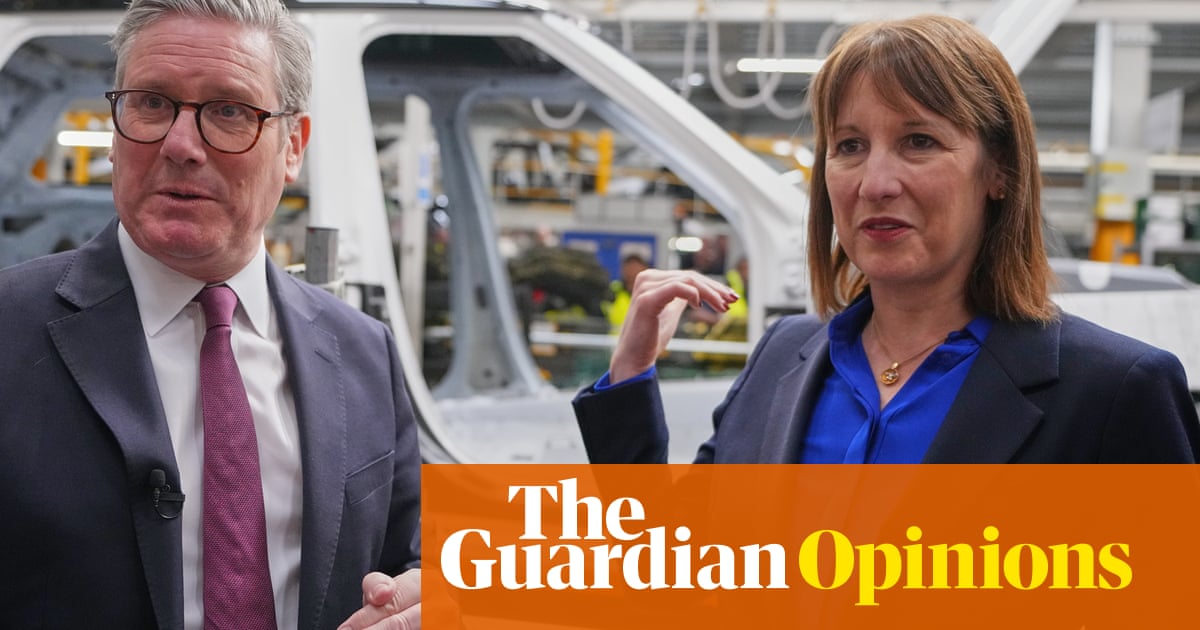Keir Starmer and Rachel Reeves have underlined how much the world has changed after Donald Trump’s“liberation day”, with the UK prime minister even declaring an end to globalisation.
But as the chancellor prepares to fly to Washington this week to meet her global counterparts at the International Monetary Fund meetings,Labourappears to see the risks purely in terms of the hit to international trade.
While frantically negotiating with Washington over tariffs, the government is pressing ahead with plans to deregulate the City – just as global financial stability appears threatened by the chaos unleashed by the White House.
Labour has taken a muscular approach to saving the steelworks in Scunthorpe, andReeves has writtenof the need for a “strong, smart and agile state to support key industries”.
Yet Labour’s stance on the UK’s highly globalised financial sector appears to remain the one set out in thechancellor’s Mansion House speechin November: that rules imposed after the 2008 crash have “gone too far”.
The governor of the Bank of England, Andrew Bailey, appeared toraise a metaphorical eyebrowat that suggestion a couple of months later, when he used a speech to warn: “Memories disappear in the rear-view mirror. And those of us who lived through it, worked through it and had to deal with it, are left saying: ‘Just remember what we had to deal with.’”
So far, little has changed, aside from regulators being hauled in repeatedly to explain themselves to the chancellor, and new remits issued, including to the Financial Conduct Authority, urging them to target growth.
But Labour gives the sense of being intensely relaxed with the big beasts of high finance. Hosting the US investment company BlackRock’s chief executive, Larry Fink, in Downing Street last autumn, Starmer tweeted: “I’m determined to deliver growth, create wealth and put more money in people’s pockets. This can only be achieved by working in partnership with leading businesses, like BlackRock.”
An edgy calm was restored to financial markets on both sides of the Atlantic last week, after a wrenching sell-off in US government debtprompted Trump to pause his “reciprocal” tariffson 9 April.
But the anxiety unleashed by wild moves in the market for Treasuries – US government debt – underlined the risks that Trump’s policy will not only reorder trade flows but could put global financial stability at risk.
Trump’s open flirtation with trying to remove the Federal Reserve chair, Jerome Powell, is unlikely to help.
Treasury yields are the benchmark against which interest rates across the world’s markets are priced; and the safe-as-houses collateral for a kaleidoscope of risky bets.
If investors really are reassessing Treasuries’ value, as some analysts have suggested – because of what in an emerging economy would be called “political risk” – the consequences could rapidly be transmitted throughout the global economy.
Such a shock would come at a time when global debt levels stand at more than three times GDP, according to the Washington-based Institute of International Finance – far higher than in the run-up to the 2008 crash.
These include the hefty debts run up by governments as they stepped in to cushion their citizens from the worst effects of the Covid pandemic, but also household borrowing and the loans piled on to companies bought by the rampaging private equity sector.
Sign up toBusiness Today
Get set for the working day – we'll point you to all the business news and analysis you need every morning
after newsletter promotion
Much of this borrowing has not been issued by banks, which have been hemmed in more cautiously with regulation since the crisis – but by other, less-regulated “private” lenders.
As a recent British Private Equity & Venture Capital Association (BVCA) update put it: “The global financial crisis was the catalyst for growth, as banks adopted more conservative lending practices and deleveraged their balance sheets.”
And since the UK remains a leading global financial centre, this barely regulated, non-bank lending has exploded here – with fund managers holding $257.9bn (£194.7bn) of “private debt” by the end of 2023, according to the BVCA: a staggering sum, which it pointed out amounted to 64% of the European total.
The Bank of England has been working hard to track how players in this shadow banking sector might respond in the event of a crisis – including by carrying out a fearsomely complex choose-your-own-adventure exercise it calls the “system-wide exploratory scenario”, launched after the Liz Truss market scare.
Its results underlined how a fiendish spider’s web of financial interconnections could amplify a potential shock.
The Bank, which keeps a much closer eye on financial stability these days, is confident it has the tools to respond, but the complexity of the system is reminiscent of the little-understood dependencies that bound the global financial system together before the 2008 crisis.
Despite the size of the UK’s finance sector, it has not tended to generate a wall of cash flooding towards key national investment priorities, or growing UK businesses, which often complain they struggle to find funding.
Labour are taking measures to encourage private sector investment into green projects and much-needed infrastructure – by consolidating pension funds, and through the new national wealth fund, for example.
Yet this more activist approach sits alongside an intention to cut back regulation rather than, say, bring shadow banking under firmer control (aside from buy now, pay later lending, where Labour have rightly pressed ahead with Tory plans to regulate – although not until 2026).
Starmer and Reeves are right to rethink globalisation. But they would be wise to remember that it is not only steelworkers in Scunthorpe who are exposed to its unforgiving forces. If a crisis hits the hyperglobalised financial system – which includes the private equity companies that have gleefully gobbled up care homes and nurseries across the UK – we are all at risk.
